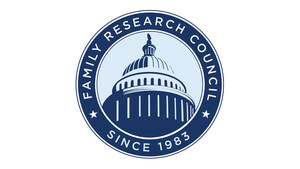WASHINGTON, Feb. 12, 2013 /PRNewswire-USNewswire/ -- Family Research Council's (FRC) Marriage and Religion Research Institute (MARRI) has released its third annual "Index of Family Belonging and Rejection" and a new derivative study, "U.S. Social Policy: Dependence on the Family." The Index is the most robust measure of the health of the U.S. family available. The derivative study covers 18 public policy outcomes, such as teenage out-of-wedlock birth, education achievement, income and productivity, dependency on government, and healthcare, across more than 500 U.S. Census areas.
(Logo: http://photos.prnewswire.com/prnh/20080930/FRCLOGO)
Study highlights include:
- The Index of Family Belonging for the U.S. is now 45 percent, meaning only 45 percent of U.S. teenagers aged 15 to 17 have grown up with both biological married parents. The biological parents of the remaining 55 percent are no longer together.
- In the average large city, just over three in ten teenagers have grown up with both married parents (36 percent) – significantly lower than the national average Family Belonging Index.
- In the five cities scoring lowest on Family Belonging, fewer than two in ten teenagers have been raised by both married parents. These cities were Cleveland, Ohio (15 percent); Baltimore, Maryland (16 percent); Washington, D.C. (17 percent); Memphis, Tennessee (17 percent); and Detroit, Michigan (18 percent).
- Utah has the highest state Index of Family Belonging, and Mississippi has the lowest.
- Portions of Middlesex County, Massachusetts; Bergen County and Hunterdon, New Jersey; and Nassau County, New York, have the highest Index of Family Belonging. In these areas, the Index of Family Belonging is around 70 percent.
- Portions of Cuyahoga County, Ohio; Baltimore, Maryland; Bronx County, New York; the District of Columbia; and Shelby County, Tennessee, have the lowest Index of Family Belonging. In these areas, the Index of Family Belonging is just over 15 percent.
MARRI Director Dr. Pat Fagan made the following comments:
"This year's new derivative study from the 'Index of Family Belonging and Rejection' shows that the intactness of the family is immensely important in determining the success and failure of a child, a state, and our nation itself.
"Family structure has profound effects on an area's economic wellbeing. There is no more important factor in determining dependence on welfare programs that aim to fix organic poverty, such as TANF and food stamps. Our analysis shows family intactness is the second most important factor in an area's level of poverty among women and children, as well as the top factor in determining an area's teenage out-of-wedlock birth rate – a source of poverty itself. Family strength is as important in determining an area's employment rate among men as the fraction of its adults that have completed high school.
"Congress and state legislatures need to evaluate every new piece of public spending to ascertain whether it will increase or decrease the number of intact married families. Many, if not most, public spending streams decrease family intactness. This is totally irrational as a long-term strategy for the social infrastructure of the nation and guarantees decreased productivity and education attainment and increased dysfunctions in every measured area of social concern.
"The biggest challenge facing the nation is solving the problem of how broken families (where mother and father no longer raise their children together) can raise children who will have intact marriages. If we do not learn how to solve this problem, the U.S. will continue to decline," Fagan concluded.
To read the "Index of Family Belonging and Rejection" click here: http://marri.us/index-2013
To read the study "U.S. Social Policy: Dependence on the Family" click here: http://www.marri.us/policy-2013
SOURCE Family Research Council
WANT YOUR COMPANY'S NEWS FEATURED ON PRNEWSWIRE.COM?
Newsrooms &
Influencers
Digital Media
Outlets
Journalists
Opted In





Share this article